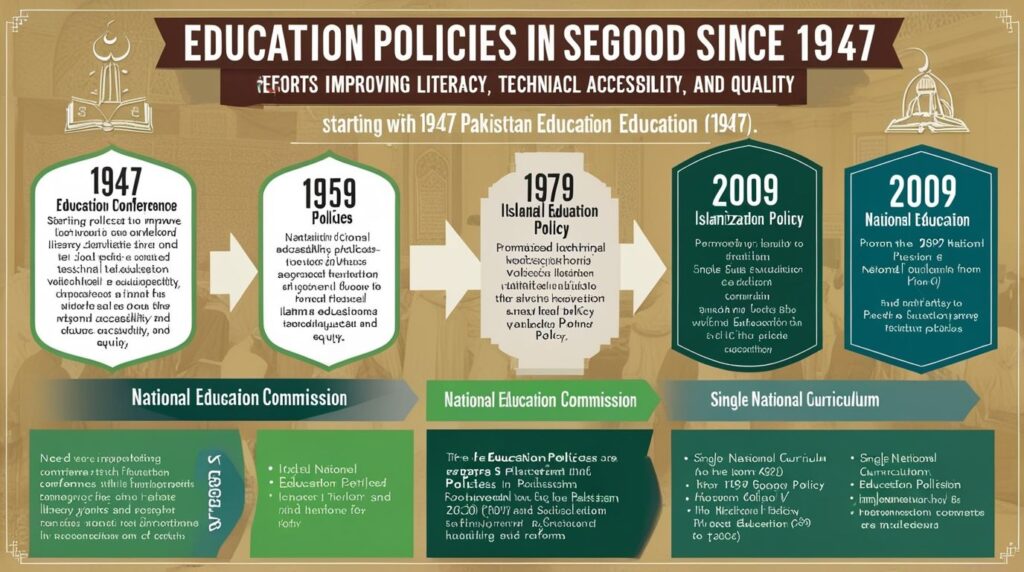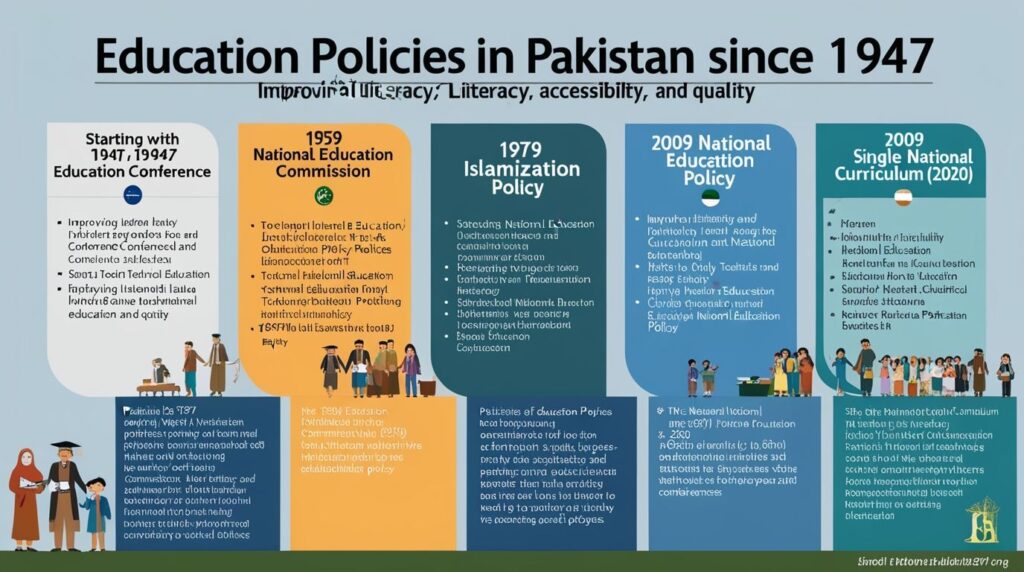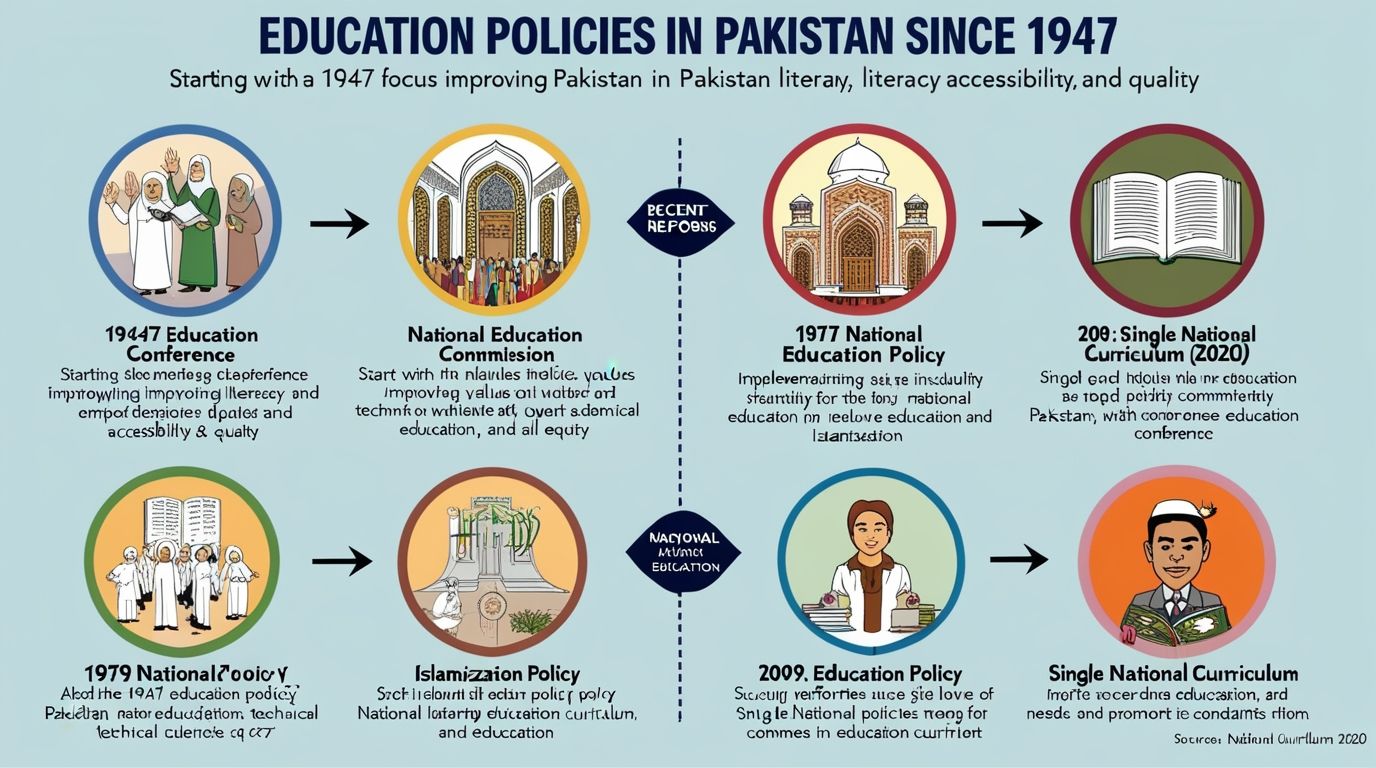Introduction
Education is the cornerstone of national development and social progress. Since its independence in 1947, Pakistan has introduced several education policies to address challenges such as literacy, curriculum development, and skill enhancement. These policies reflect the country’s evolving socio-economic needs and efforts to modernize its education system. This article provides an in-depth review of Pakistan’s education policies from 1947 to the present, highlighting their objectives, key features, and impacts.
1. All Pakistan Education Conference (1947)
The foundation of Pakistan’s educational framework was laid during the All Pakistan Education Conference held in Karachi from November 27 to December 1, 1947.
- Objectives: Establish a unified system aligned with Islamic values and emphasize national identity.
- Key Features:
- Universal primary education.
- Focus on technical and vocational education.
- Promotion of science and modern knowledge.
- Impact: It set the ideological framework for the education system, emphasizing national cohesion and economic development (Hoodbhoy, 1998).
2. National Education Commission (1959)
Under President Ayub Khan, the commission aimed at comprehensive reforms.
- Objectives: Develop a modern education system to meet economic and industrial demands.
- Key Features:
- Expansion of primary education.
- Introduction of technical and vocational subjects.
- Focus on Islamic teachings and character building.
- Impact: The policy initiated curriculum reforms and emphasized teacher training (Rahman, 2004).
3. Education Policy (1970)
Introduced during General Yahya Khan’s regime, this policy focused on literacy and equality.
- Objectives: Achieve universal literacy and reduce regional disparities.
- Key Features:
- Free and compulsory education up to Grade 10.
- Expansion of adult literacy programs.
- National integration through a uniform curriculum.
- Impact: Although ambitious, implementation was hindered by political instability (Ashraf, 2016).

4. National Education Policy (1972–1980)
Education Policies in Pakistan Since 1947, the Pakistan People’s Party (PPP) introduced this policy emphasizing social justice.
- Objectives: Nationalize educational institutions and improve quality.
- Key Features:
- Nationalization of private schools and colleges.
- Free education up to secondary level.
- Establishment of vocational training centers.
- Impact: It increased educational access but faced administrative and financial challenges (Haque, 1997).
5. National Education Policy (1979)
General Zia-ul-Haq’s policy focused on Islamization.
- Objectives: Strengthen Islamic values in the education system.
- Key Features:
- Introduction of compulsory Islamic studies.
- Expansion of madrassa education.
- Emphasis on moral development.
- Impact: Critics argued it reduced focus on science and technology, but it aligned education with religious values (Iqbal, 2010).
6. Education Policy (1992)
This policy sought to modernize education.
- Objectives: Address dropout rates and promote higher education.
- Key Features:
- Focus on technical education.
- Encourage public-private partnerships.
- Promote female education.
- Impact: It emphasized higher education reforms but lacked proper execution (Khan, 2018).
7. National Education Policy (1998–2010)
Education Policies in Pakistan Since 1947, this policy aimed at improving literacy rates and addressing gender disparities.
- Objectives: Provide free and compulsory education.
- Key Features:
- Curriculum reforms with IT integration.
- Adult literacy programs.
- Teacher training and evaluation systems.
- Impact: Focused on quality education but failed to meet targets due to resource constraints (Rahman, 2019).

8. Education Sector Reforms (2001–2005)
These reforms aligned education with globalization trends.
- Objectives: Decentralize education management and improve infrastructure.
- Key Features:
- Local governance in education.
- Increased funding for teacher training.
- Integration of private schools.
- Impact: Improved governance but faced criticism for insufficient monitoring (Ahmed, 2013).
9. National Education Policy (2009)
This policy addressed quality and inclusivity.
- Objectives: Ensure equity and quality education.
- Key Features:
- Compulsory education up to secondary level.
- Focus on early childhood education.
- Standardized testing and assessments.
- Impact: Enhanced accountability but required more infrastructure development (Jalal, 2020).
10. National Education Policy (2017)
Focused on sustainable development goals (SDGs).
- Objectives: Modernize education to meet global standards.
- Key Features:
- Skills training programs.
- Digital literacy.
- Gender equality and inclusivity.
- Impact: Integrated 21st-century skills but faced delays in implementation (Farooq, 2022).
11. Single National Curriculum (2020)
Introduced to eliminate disparities between public and private schools.
- Objectives: Provide uniform education and promote national identity.
- Key Features:
- Unified syllabus across all institutions.
- Emphasis on Islamic education and cultural values.
- Focus on technology and innovation.
- Impact: Aimed to reduce inequality but faced criticism for lack of diversity in curriculum (Hussain, 2023).
Challenges in Education Policies
- Implementation Issues: Lack of infrastructure and monitoring mechanisms hinder policy execution.
- Resource Constraints: Limited funding affects quality and accessibility.
- Political Instability: Frequent policy changes disrupt continuity.
- Inequality: Regional and gender disparities persist.
Conclusion
Education policies in Pakistan have evolved to address emerging challenges, focusing on accessibility, quality, and skill development. While several reforms have shown promise, implementation gaps remain a significant hurdle. Future policies should emphasize sustainable strategies, inclusivity, and technological integration to meet global standards.
References
- Hoodbhoy, P. (1998). Education and the State. Karachi: Oxford University Press.
- Rahman, T. (2004). Denizens of Alien Worlds: A Study of Education, Inequality and Polarization in Pakistan. Karachi: Oxford University Press.
- Ashraf, M. (2016). “Education Policy Development in Pakistan: 1947–2016.” Journal of Education Research.
- Haque, N. (1997). Education in Pakistan: Issues and Policies. Islamabad: National Book Foundation.
- Iqbal, Z. (2010). “Islamization and Education Policies in Pakistan.” Journal of Social Sciences.
- Khan, S. (2018). Modern Education in Pakistan. Lahore: Ferozsons.
- Rahman, F. (2019). “Educational Reforms in Pakistan: Challenges and Opportunities.” Journal of Education Policy.
- Farooq, R. (2022). Digital Education and Policy. Islamabad: Education Foundation.

9 thoughts on “Education Policies in Pakistan Since 1947”
Comments are closed.